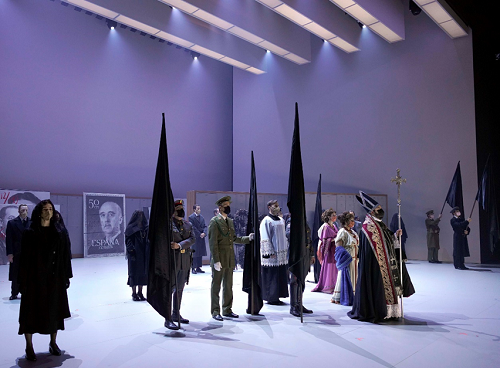 Spain Luis de Pablo, El Abrecartas (The Letter Opener): Teatro Real Chorus and Orchestra / Fabián Panisello (conductor). Teatro Real, Madrid, 22.2.2022. (JMI)
Spain Luis de Pablo, El Abrecartas (The Letter Opener): Teatro Real Chorus and Orchestra / Fabián Panisello (conductor). Teatro Real, Madrid, 22.2.2022. (JMI)

Production:
Director – Xavier Albertí
Libretto – Vicente Molina Foix
Sets – Max Glaenzel
Costumes – Silvia Delagneau
Lighting – Juan Gómez Cornejo
Choreography – Roberto G. Alonso
Cast:
Federico García Lorca – Airam Hernández
Vicente Aleixandre – Borja Quiza
Miguel Hernández – José Antonio López
Alfonso – Mikeldi Atxalandabaso
Salvador/Setefilla – Ana Ibarra
Ramiro – Vicenç Esteve
Eugenio D’Ors – David Sánchez
Rafael – José Manuel Montero
Andrés Acero – Jorge Rodríguez-Norton
Comisario – Gabriel Díaz
Manuela – Magdalena Aizpurua
This is composer Luis de Pablo’s final opera, and a posthumous work: he died last October in Madrid, a victim of the pandemic that has been plaguing us. De Pablo is possibly the best-known contemporary Spanish composer, and his work includes numerous movie scores and a total of six operas. I have seen four of them now, from the first, Kiú, which premiered in 1983, until this one which took him almost five years to complete.
El Abrecartas is based on a novel by Vicente Molina Foix, who was also responsible for this libretto. The work is a tribute to the Generation of ’27, an influential group of poets whose members included Vicente Aleixandre, Miguel Hernández and, above all, the always-remembered Federico García Lorca.
The opera is largely drawn from passages in letters, hence its title, and it covers the years from 1932 to 1956. It consists of a prologue and six scenes, the first three of which are dedicated to the aforementioned poets and their deaths, while the latter scenes have to do with Franco’s repression. Luis de Pablo’s music is rich in timbre and very personal and, like his previous operas, it is not a work to excite what one might call a traditional operagoer. In any case, it seems fitting to me that Teatro Real has decided to stage this posthumous opera.

Director Xavier Albertí’s staging is a simple one. The set consists of mobile modules that represent large archives, and the costumes are appropriate. The production does a good job of directing actors and moving the crowds, especially in the second part of the opera.
The conductor was Fabián Panisello, whom I was seeing for the first time. He showed a great knowledge of the opera, and his reading had no ups and downs. The orchestra, which occupied the theater’s side boxes as well as the pit, was excellent under his baton.
There are numerous characters in this opera, and one cannot say that there is a prominent role. Federico García Lorca was played by Airam Hernández, who has an attractive voice and made a strong impression. Baritone Borja Quiza gave life to Vicente Aleixandre and did nicely, although his voice tends to lag behind the music somewhat.
The best performance of the night came from tenor Mikeldi Atxalandabaso as Alfonso, while baritone José Antonio López as Miguel Hernández was a bit coarse vocally. The many supporting singers did well in their roles.
Teatro Real was at 85% to 90% of capacity. The audience did not show a great deal of enthusiasm for the performance.
José M. Irurzun